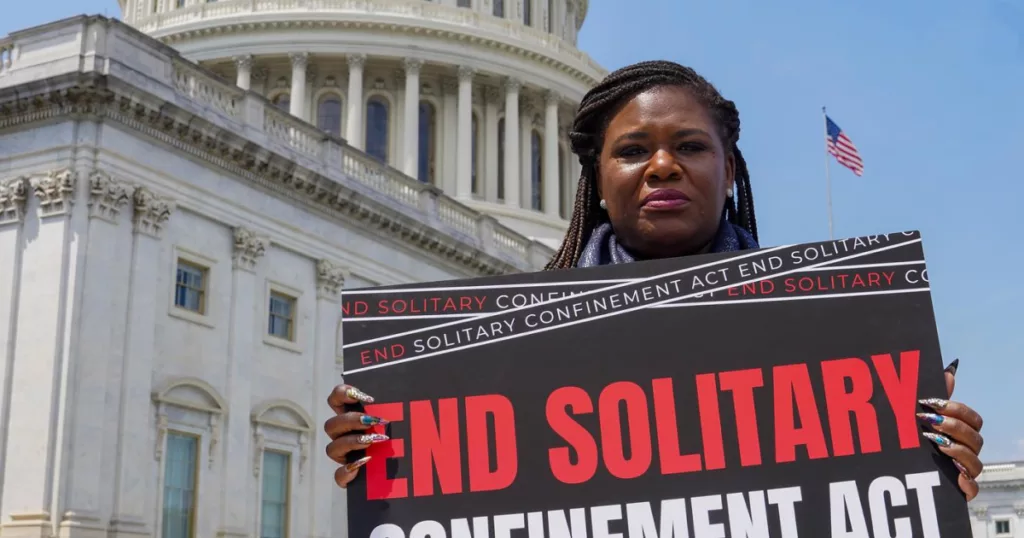Solitary confinement is a moral catastrophe. UN experts have condemned solitary as psychological torture — and that’s exactly what it is. This practice is traumatic for people subjected to it, harmful to communities, and isolating for loved ones. Moreover, it is disproportionately inflicted on Black and brown folks, young people, LGBTQ+ people, and other marginalized communities.
Congresswoman Cori Bush
End Solitary Confinement Act Press Release
Being held in solitary confinement means that individuals are locked up alone in a cell the size of a parking space for nearly the whole day, with little to no opportunity to interact with other prisoners, visitors, or loved ones. A significant body of research has shown that solitary confinement creates long-term physical and mental harm. Meanwhile, solitary confinement has not been shown to deter future rule violations or violence, and has in fact been associated with increased recidivism.
Yet more than 123,000 people are still held in solitary confinement today in federal, state, and local prisons and jails — for 22 hours or more per day. Of these, 11,000 people are held in solitary confinement in federal prisons on any given day — constituting nearly 7% of the total federal prison population.
Alarmingly, the 11,000 figure represents an increase in the use of solitary confinement in federal correctional facilities in the last few years — despite President Joe Biden and Vice President Kamala Harris’ public commitments to ending solitary confinement during their presidential campaigns, the appointment of a long-time prison reformer Colette Peters to lead the federal Bureau of Prisons, and President Biden’s May 2022 Executive Order to report on the steps that the Department of Justice is taking to limit the use of solitary confinement.
This dangerous and harmful disconnect is why the End Solitary Confinement Act, introduced by Representative Cori Bush, is as urgent as ever. The bill builds on “A Blueprint for Ending Solitary Confinement By the Federal Government” put out by the Federal Anti-Solitary Taskforce in 2021. Specifically, the End Solitary Confinement Act would:
- End solitary confinement in federal correctional facilities, while allowing for up to four hours of separation for emergency de-escalation;
- Require all people in custody to have access to at least 14 hours of daily meaningful group out-of-cell time, including at least 7 hours of daily group programming;
- Enhance due process protections, such as access to representation and use of neutral decision-makers;
- Create oversight and enforcement mechanisms, including mandatory reporting, private cause of action, community oversight, and greater media access; and
- Incentivize states and localities to adopt similar bans on solitary confinement by decreasing certain federal funds allocated to any state or local entity that does not do so.
Recent polling data shows that the majority of voters across the country and across the political spectrum support Congress ending solitary confinement entirely beyond a limit of four hours. With the End Solitary Confinement Act, Congress and the Biden Administration can be leaders on this issue and set a strong model for state and local jurisdictions to follow in ending the use of solitary confinement.
Over the past year, Campaign Zero has gathered data on solitary confinement policies across the country and spoken with national and local advocates to support efforts to abolish it as a practice in the United States. Campaign Zero endorses the End Solitary Confinement Act and calls on everyone to contact their representative to support this important legislation.
Solitary confinement is torture and torture should have no place in our society. It takes a devastating toll on mental health, heightens the risk of self-harm and suicide, increases recidivism, and can lead to severe psychological trauma. We need to lead with restorative justice and recognize the human dignity of incarcerated people by abolishing this dehumanizing practice once and for all.
Congresswoman Rashida Tlaib
End Solitary Confinement Act Press Release
Cited sources
- Bush, Colleagues Introduce Historic Bill to End Solitary Confinement. (2023).
- Data for Progress. (2022). A Bipartisan Majority of Voters Support Strongly Restricting Solitary Confinement, Including Placing a Four-Hour Limit on the Practice.
- Federal Anti-Solitary Taskforce. (2021). A Blueprint for Ending Solitary Confinement by the Federal Government.
- Gordon, S. (2014). Solitary Confinement, Public Safety, and Recdivism. University of Michigan Journal of Law Reform, 47(2), 495.
- James, K., & Vanko, E. (2018). The Impacts of Solitary Confinement. Vera Institute of Justice.
- Solitary Watch, & Unlock the Box. (2023). Calculating Torture: Analysis of Federal, State, and Local Data Showing More Than 122,000 People in Solitary onfinement in U.S. Prisons and Jails.
- Steiner, B., & Cain, C. M. (2016). The Relationship Between Inmate Misconduct, Institutional Violence, and Administrative Segregation: A Systematic Review of the Evidence. In Restrictive Housing in the U.S.: Issues, Challenges, and Future Directions. U.S. Department of Justice, National Institute of Justice.
- THE BIDEN PLAN FOR STRENGTHENING AMERICA’S COMMITMENT TO JUSTICE. (2020).
- Unlock the Box. (2023, February 3). AS DOJ ISSUES REPORT FOLLOWING PRESIDENT BIDEN’S EXECUTIVE ORDER ON SOLITARY, THE NUMBER OF PEOPLE IN SOLITARY IS NEARLY 7% HIGHER NOW THAN BEFORE THE ORDER.
